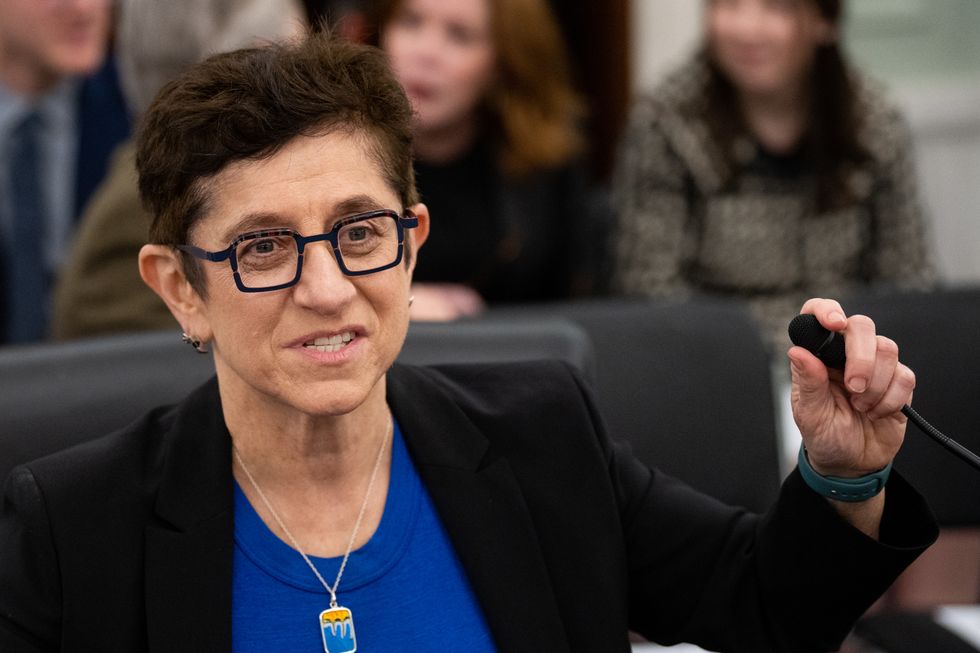
The U.S. Senate’s refusal to confirm Gigi Sohn in the nearly 500 days since President Joe Biden first nominated her to the Federal Communications Commission stands in stark contrast to the chamber’s treatment of other candidates, including Ajit Pai.
Sohn on Tuesday attended her third U.S. Senate Committee on Commerce, Science, and Transportation hearing—during which Sen. Ted Cruz (R-Texas), the panel’s ranking member,
took aim at not only the candidate but also digital rights group Fight for the Future.
Meanwhile, advocacy groups supporting Sohn in the face of a telecommunications industry
smear campaign and homophobic attacks yet again blasted the Senate’s delay—which has not deterred Biden, who renominated Sohn last month.
Caitlin Seeley George, Fight for the Future’s campaigns and managing director, compared the stalled votes for Sohn to the Senate’s confirmation of GOP commissioners Ajit Pai and Nathan Simington under former President Donald Trump.
“It is absolutely absurd that Gigi Sohn, a dedicated advocate for the public interest, has gone through three hearings in front of the Senate Commerce Committee,” she argued, “when controversial nominees with massive conflicts of interest like Ajit Pai and Nathan Simington sailed through Senate approval (almost as absurd as Sen. Cruz calling out Fight for the Future because we hold lawmakers from both sides of the aisle accountable!).”
Sohn, an attorney who co-founded the advocacy group Public Knowledge, previously served as counselor to former FCC Chair Tom Wheeler, who was appointed in 2013 by then-President Barack Obama.
Pai—an ex-Verizon attorney who destroyed net neutrality rules—was initially nominated to the FCC in 2011 by Obama and unanimously confirmed by the Senate the next year. After Trump took office in January 2017, he picked Pai as FCC chair, then renominated him to the leadership role that March, which the Senate confirmed that October.
The month after Trump lost to Biden in 2020, the Senate confirmed the outgoing president’s nomination of Nathan Simington to the FCC, despite critics’ warnings. Fight for the Future’s Evan Greer
said at the time that he was “even worse than Ajit Pai.” Simington remains at the FCC, along with Republican Brendan Carr and Democrats Geoffrey Starks and Jessica Rosenworcel, the current chair. Sohn
addressed the impact of the vacancy for the fifth commissioner post in her testimony Tuesday.
“The FCC has been without a majority for the entirety of the Biden administration—over two years—at a time when closing the digital divide is front and center,” she said. “There are too many important issues in front of the commission to lack a full complement of members, including improving the broadband maps, fixing the Universal Service Fund, closing the homework gap, ensuring fair access to broadband, and protecting consumers’ privacy. Americans deserve a full FCC where I could play a critical role in addressing every one of these, but time is of the essence.”
Sohn also said that “I believe deeply that regulated entities should not choose their regulator. Unfortunately, that is the exact intent of the past 15 months of false and misleading attacks on my record and my character. My industry opponents have hidden behind dark money groups and surrogates because they fear a pragmatic, pro-competition, pro-consumer policymaker who will support policies that will bring more, faster, and lower-priced broadband and new voices to your constituents.”
Rights groups echoed Sohn’s criticism of industry attacks on her and agreed that the Senate needs to act urgently. As Seeley George put it: “There is no question that Gigi Sohn is qualified to sit on the FCC. The only reason we are going through yet another hearing is because telecom companies, and the lawmakers shilling for them, know that when she is appointed she will put what’s best for the American people over industry profits.”
“The opposition to Sohn has been unprecedented, and has included personal, blatantly homophobic attacks (something we’re disappointed Democratic lawmakers did not condemn during the hearing). But, as Sohn said today, regulated entities should not get to pick their regulator,” she continued. “Over the past year and a half the FCC could have been getting to work to restore net neutrality, ensure universal access to affordable broadband, address unregulated use of cellphone location data and the risk it poses to abortion rights, and protect the public from the abuses of telecom monopolies.”
Free Press Action general counsel and vice president of policy Matt Wood similarly asserted that “confirming Gigi Sohn to serve at the FCC is the best thing the Senate can do to ensure media, tech, and broadband policy actually serves the public. No other nominee in the FCC’s history has had to wait so long for a confirmation vote. She is obviously and supremely qualified to serve as a watchdog for ordinary people across the country.”
He continued:
As commissioner, Sohn will fight on behalf of working families trying to pay their high monthly phone and internet bills. She will work to ensure that the benefits of broadband reach everyone, and to curb the runaway media consolidation that has decimated local journalism and harmed Black and Brown communities in particular. Without Sohn’s crucial fifth vote at the agency, the FCC cannot fully accomplish its mission.
Sohn’s impeccable credentials are the very things that have compelled the telecom and broadcast industry to hold her nomination in limbo. We’ve had to wait for far too long—with endless delays and bigoted attacks that have prevented the deadlocked agency from adopting some crucial policies that would help people connect and communicate.
After calling out Cruz for “aiding and abetting the smear campaign designed to benefit the massive communications firms subject to FCC oversight,” Wood declared that “the Commerce Committee and then the full Senate should advance this nomination without further delays, which only benefit those big companies orchestrating this impasse.”
According to Wood, “If the Senate genuinely wants to improve the lives of internet users, cellphone customers, TV watchers, and radio listeners—aka, everyone—it can start by confirming this excellent public servant to the FCC immediately.”




